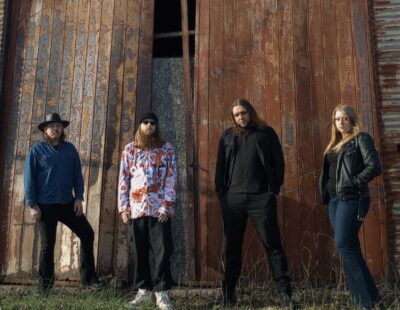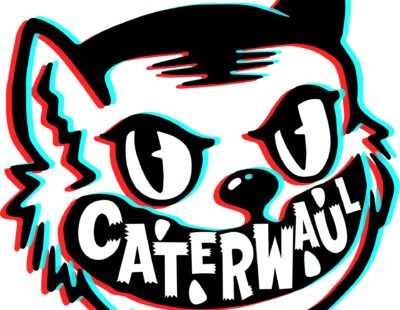Christmas Day 2014 brought Rosetta fans–and really to anyone who likes a good story–a special gift in the form of Rosetta: Audio/Visual. The 65 minute documentary not only delves into the Philadelphia quartet’s history, but happens to capture the group at its most critical juncture. At its heart, the doc is just a story about four guys who love playing music, and a rather compelling one at that. Fortunately, we were able to catch up with filmmaker Justin Jackson and pepper him with some questions.
You can check out more about the project and buy a digital copy here.
Briefly walk us through the project from conception to completion. For instance, I know what you originally set out to do (a short portrait of the band) is not exactly how things ended up.
I was between creative projects in the winter of 2010/2011, and I really wanted to do something that married my vocation (documentary filmmaking/video production) and my biggest passion (music) together into one piece of work. I was, and still am, a fan of Rosetta, and I knew they lived in Philly – a location within a commutable distance – and I really had no idea what themes would develop, who would present well on camera, or if there was even a story to tell. As a documentary filmmaker, I find it’s best not to enter projects with preconceived notions. Initially, I felt the best possible outcome would be a ten or twenty minute short film that would profile the band.
After filming a couple shows and interviews, it really became apparent to me that this band was going through a very important transition. Moreover, each band member was personally going through a series of important changes/realizations, and I was at the right place/right time to capture it. There was a real story from which a feature length film could be made. When I say story, I’m speaking in terms of screenplay principles: inciting incident, conflict, protagonist, three act structure, controlling ideas, binary story values, etc.
I had no idea in late 2010 that I was about to embark on a film that would tell the story of what was, to that point, Rosetta’s biggest decision of their career. I also had no idea I was about to make several new amazing friends that would enrich my life for years to come. The guys in Rosetta and the people in their circle are fantastic; I consider myself lucky to have become friends with such great people.
Were you surprised that the band was open to the project, both initially and as some of the storylines started to develop/be revealed? You see the guys deal with some really heavy stuff.
At first, ABSOLUTELY. All of the guys were immediately warm and inviting. As an outsider with a camera, I had never experienced that kind of warmth, hospitality, and acceptance. It was amazing. Most of my projects start with either a cold call or an email. I was a complete stranger to the band. That they were immediately so open and inviting is a testament to how giving they are as people.
Each member of the band was always forthcoming about their life experiences. I never had to search for any kind of plot point for this film. Everything that the viewer sees in the film was mentioned by each member, very openly, during interviews. Part of my method is to interview with very open-ended questions. I think leading questions can both manipulate and limit what your subject can tell you. Rosetta wanted to share their story and my job was to allow the story to unfold the way it wanted.
One thing that did surprise me occurred during the recording sessions for The Anaesthete. I knew that the record was very important to them but I didn’t know the band would break up if the record didn’t recoup studio costs. I learned this halfway into the first day of filming while I was interviewing BJ (drummer). This development floored me. Immediately my shooting schedule went out the window for the remaining three days I was there. I knew I had to rethink my filming strategy in order to really convey the mood of those recording sessions, and I really ramped up my productivity for the remainder of that shoot. As it happens, the Anaesthete shoot is my single proudest production as a documentarian – what a great privilege to be in the trenches with such an amazing band!

Were you aware of the label situation going into the project? As it became the film’s overarching thread, were you concerned that people would not be willing to talk about a rift that has obviously impacted their lives?
I was not aware of the business/personal relationship Rosetta had with Translation Loss Records prior to filming. However, the very first interview I did for the film was with Armine (vocalist) and at that time he was obviously very upset about the state of his relationship with Translation Loss. Armine provided me with all of the details very early on in the process. Because this was the way I found out about that particular relationship, I was not worried about members of Rosetta not talking about the situation. I would never want anyone to talk about something they do not wish to reveal. The guys in the band were always open about their relationship with the label. Moreover, they always made it a point to note how much they appreciated Translation Loss and how they, Rosetta, had a part to play in the dissolution of that relationship.
One thing I would like to point out involves how I structured the story. The most traditional screenplay structure is one in which there is a protagonist (the hero who wants something) and an antagonist (the villain preventing the hero from achieving his/her goal). In Rosetta: Audio/Visual, there are dual protagonists – both Rosetta and Translation Loss are the protagonists. The real villain of this story, if there is one, is the music industry as that is what is getting in the way of their relationship. Drew [Juergens] from Translation Loss is such a sweet guy and he was so giving in his interview. I just do not see those guys as anything but upstanding and humble. It’s the story of Translation Loss as much as it’s the story of Rosetta.
As much as this is a film about Rosetta, it’s also about the trials and tribulations of being in a band. Is there one thing you hope new bands starting out can glean from your work and Rosetta’s story?
This is a very good question and one that I had not thought of until you posed it. As someone who is not part of a band or the “music industry”, I always looked at this from the perspective of a non-musician. Therefore, my goal was to really show viewers what being a musician is like in today’s music climate. From the film’s inception I made it a point to turn the “rock doc” genre on its head. There is no sex. There are no drugs. There is no excess. This is a film about a group of four individuals in a working class band and two guys who own a working class label, all of whom sacrifice their time, money, and health in order to express themselves through music. In other words, unless you’re in the top 1% of recording artists, you’re not going to be rich and famous.
In terms of new bands, my hope is that the music of Rosetta inspires them to be more experimental with their music and take more artistic chances. It is also my hope that vocalists do everything they can to train and take care of their vocal chords. Armine does a great deal of work staying in shape and keeping his vocal chords healthy.
You released the film on Christmas Day. What has the reaction been like so far, both from fans and the band?
It was kind of a crazy idea to release on Christmas Day, but the schedule just worked out that way. We released the film primarily as a digital download starting at $9.99 with the pay-what-you-wish model. We will be selling physical copies early this year. No specific date yet but right now we’re aiming for mid-February. Our release method is a way of honoring the approach Rosetta takes when releasing their music.
Reaction from fans and viewers has been very, very positive. This is the most enjoyable part of making a film. Seeing your project have a positive impact on lives is a very unique and rewarding experience. I would say more than half of our viewers are from overseas. I never thought I’d make a film that would have an impact on someone from the Eastern Bloc or China. It’s incredible and something all of us on the team appreciate very much.
As far as the band’s response goes, Dave (bassist) sent me a very warm and positive text right after he watched it. That meant a great deal to me.
IndieGogo played a large role in this project — tell us a little why you decided to go that route. Were you surprised by the level of support?
The IndieGogo campaign we had for the film was huge, and I cannot overstate how important it was. The film would not have been possible without it. I knew that Rosetta had done a Kickstarter for their split with Junius and I saw how passionate the fans were. As this was a project I started purely based on love for this band, I thought the fans would be receptive to the campaign.
Production for the film wrapped in late 2013. In order to make a film worthy of Rosetta, I knew I would need more money to finish the film. A large part of the completion of the film involved sound design and sound mixing on a stage in Burbank, CA. I cannot stress how important audio is in a movie, especially when music is a central character in a film. When audio is poor, a viewer notices it. When audio is great, it tends to go unnoticed, at least on a conscious level. In this way, sound design is a very unsung art form so I feel compelled to praise the work of J.M. Davey (the sound designer on the film). Davey is a close personal friend and we have collaborated in the past. We had several preliminary conversations revolving around what he and I wanted to accomplish. After those conversations took place I knew there was no way we could fund the remainder of the film. It was at this point, probably in the late spring of 2014, that I started planning our Indiegogo campaign. We put a lot of thought into the packages we offered contributors and we really wanted to offer each contributor a personal and unique experience. I believe that fans have a right to be in direct contact with the artist and it was my goal to empower the fan/contributor with the rewards we offered. We wanted there to be a benefit to contributing to the film’s creation.
I was surprised at how well the Indiegogo campaign did. Our goal was $6,000. We raised just under $8,000. It was remarkable and I cannot thank all of our supporters enough for believing in this film.
What’s next for you project-wise?
My next documentary will be a feature on Sokol Todi, an Albanian neuroscientist who lives in Ann Arbor, Michigan. The film will explore his personal as well as professional relationships along with his scientific research. Sokol has his own lab at Wayne State University, where he also teaches, and is using fruit flies in hopes of identifying proteins/genes that cause Ataxia and dementia. Millions of people are afflicted by the diseases he’s researching. Sokol is an amazing human being – super intelligent, unbelievably kind, and immeasurably supportive. To say I’m excited about this film is a huge understatement.

Justin Jackson
Film website
Purchase page
Justin’s personal webpage
You can also pick up a copy of Rosetta’s original score for the documentary here. All the revenue from the score album will go directly to the recording sessions for Rosetta’s next full length.






